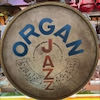Hello!
I'd like to turn some legs for a wood and leather camping stool, similar to this:
lee-valley-campaign-stool.jpg
I have access to a JWL-1236 that has no tools. In order to turn legs similar to the picture, what tools would you recommend?
And would you recommend buying a set, either HF or the Benjamin's Best 6 piece, or if only a few tools are needed, investing in some higher quality ones like Thompson's?




 Reply With Quote
Reply With Quote




